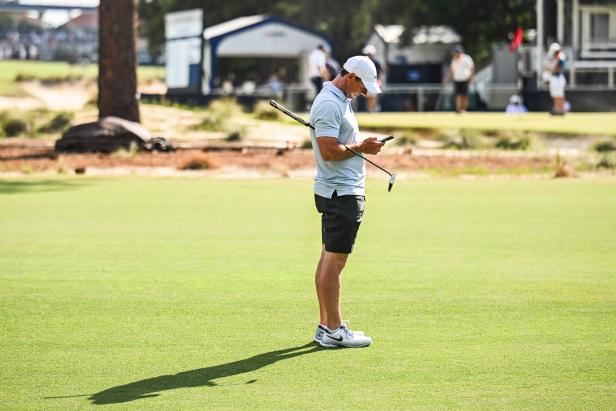Turn your phone off! Study finds work emails and calls on the course will ruin your game – Australian Golf Digest

- by Admin
- August 7, 2024

A new study published in the International Journal of Performance Analysis in Sport officially tells us what we (probably) already knew: Work emails and phone calls are ruining our golf games and costing us shots. A group of researchers at Stellenbosch University in South Africa scrutinized 186 recreational golfers at five different clubs and came to a definitive conclusion that work smartphone use has a “small negative effect on performance.”
“We found that when golfers used their phones for personal reasons, like checking social media feeds or responding to messages, their performance was unaffected. However, when they read work-related emails or took business calls, their performance dropped,” said lead researcher Dr. Daniël le Roux. Postgraduate students Lise Carstens, Cole Walburgh and Christen Werth were also key participants in putting together this study.
“Our study highlights the dual-edged nature of smartphones on the golf course,” le Roux writes. “While they offer convenience of staying connected, their intrusion can impair focus and performance, and ultimately make the game less enjoyable.”
The study even points to a 2015 Golf Digest feature by Alan Pittman on smartphone use and its detriments. After a survey of 233,000 golfers, GD found that more than 40 percent of golfers felt the need to check their phones every few holes. It would seem fair to conclude that that number has increased over the past nine years.
Dougal Waters
RELATED: Is it ever OK to answer a phone call on a golf course? Let’s debate
The reason that smartphone use related to work hurts your game more than just general messaging and browsing, according to the study, is due to the “cognitive switching between shot routines and work-related concerns.” These switches can harm one’s pre-shot routines in which golfers can’t completely remove themselves from their problems on the job. That, in turn, throws them off when it comes to their actual golf game.
“Mind wandering during these routines has been shown to harm performance,” the study reads. “Arguably, such residual effects may be particularly strong in cases where between-shot smartphone interaction involves work-related communication and the configuration of complex task-sets in working memory. For example, a work-related call from a colleague concerning an intricate business problem may be more distracting [and harmful for performance] than a casual instant message from friend.”
It’s also critical to reflect after your shot in order to see what worked (or in many cases, what didn’t). It becomes tougher to do just that if you still have random outside grievances rattling around your head. The study findings make it clear that you should be thinking about golf intricacies like “course set-up, ball lie, pin position, wind speed/direction, technical changes made since last facing a similar shot or situation” instead of answering a question on Slack or scheduling a meeting in Outlook after the round.
It’s not like this is breaking news, but it’s always nice to have some scientific back-up for when you tell your boss that you need four to five hours of uninterrupted golf. Just send this study to your coworkers while on the course to keep the work at a minimum and your game on the rise. We’re sure they’ll understand.
MORE: She was a legendary Olympian and Hall-of-Fame golfer. These 3 golf tips got her started
This article was originally published on golfdigest.com
The Latest News
-
January 10, 2025UK seaside town leaves Australian tourist completely baffled
-
January 10, 2025Kyrgios steps up Australian Open preparation in a positive sign
-
January 10, 2025Watch Hideki Matsuyama (unintentionally!) hit his ball through an 8-inch gap in palm trees – Australian Golf Digest
-
January 10, 2025PGA Tour monitoring Los Angeles fires with Riviera stop scheduled in four weeks – Australian Golf Digest
-
January 10, 2025Melbourne Cup prize money goes missing after error





